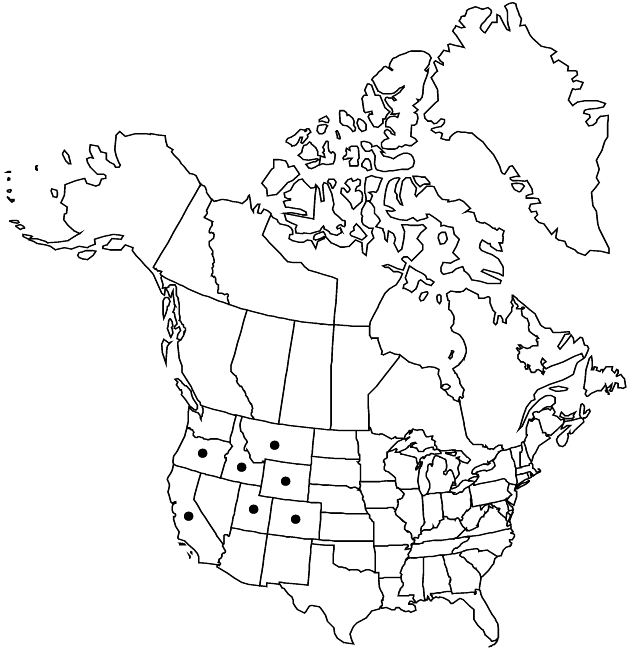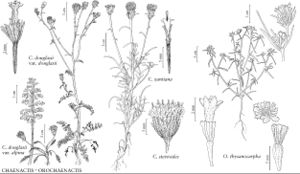Difference between revisions of "Chaenactis douglasii var. alpina"
in A. Gray et al., Syn. Fl. N. Amer. 1(2): 341. 1884.
FNA>Volume Importer |
FNA>Volume Importer |
||
| Line 36: | Line 36: | ||
|elevation=2700–4000 m | |elevation=2700–4000 m | ||
|distribution=Calif.;Colo.;Idaho;Mont.;Oreg.;Utah;Wyo. | |distribution=Calif.;Colo.;Idaho;Mont.;Oreg.;Utah;Wyo. | ||
| − | |discussion=<p>In California, relatively few populations of <i>Chaenactis douglasii</i> approach typical <i></i>var.<i> alpina</i>. A report of <i></i>var.<i> alpina</i> from the Spring Mountains of Clark County, <i>Nevada</i> (P. Stockwell 1940, as <i>C. panamintensis</i>), could not be confirmed and was likely based on stunted <i></i>var.<i> douglasii</i>; it should be sought in the Carson, Ruby, and Snake ranges of northern <i>Nevada</i>. A report of <i></i>var.<i> alpina</i> from southern British Columbia has not been verified by me. Variety alpina is sometimes cultivated, especially for rock gardens, and it may be encountered outside its native range.</p><!-- | + | |discussion=<p>In California, relatively few populations of <i>Chaenactis douglasii</i> approach typical <i></i></i>var.<i><i> alpina</i>. A report of <i></i></i>var.<i><i> alpina</i> from the Spring Mountains of Clark County, <i>Nevada</i> (P. Stockwell 1940, as <i>C. panamintensis</i>), could not be confirmed and was likely based on stunted <i></i></i>var.<i><i> douglasii</i>; it should be sought in the Carson, Ruby, and Snake ranges of northern <i>Nevada</i>. A report of <i></i></i>var.<i><i> alpina</i> from southern British Columbia has not been verified by me. Variety alpina is sometimes cultivated, especially for rock gardens, and it may be encountered outside its native range.</p><!-- |
| − | --><p>Local populations of these largely alpine plants can appear highly distinctive and uniform, leading to their past recognition as a separate species. Across the range, most such populations intergrade continuously with local populations of <i></i>var.<i> douglasii</i>, as is often evident among specimens of the same gathering. The relative development of roots, stems, and branches appears highly mutable throughout <i>C. douglasii</i>.</p><!-- | + | --><p>Local populations of these largely alpine plants can appear highly distinctive and uniform, leading to their past recognition as a separate species. Across the range, most such populations intergrade continuously with local populations of <i></i></i>var.<i><i> douglasii</i>, as is often evident among specimens of the same gathering. The relative development of roots, stems, and branches appears highly mutable throughout <i>C. douglasii</i>.</p><!-- |
| − | --><p><i>Chaenactis</i> pumila Greene was assigned to the variety or species alpina by R. D. Dorn (1988c), P. Stockwell (1940), and others; it is a small form of <i></i>var.<i> douglasii</i>, as assigned by D. C. Eaton in S. Watson (1871).</p> | + | --><p><i>Chaenactis</i> pumila Greene was assigned to the variety or species alpina by R. D. Dorn (1988c), P. Stockwell (1940), and others; it is a small form of <i></i></i>var.<i><i> douglasii</i>, as assigned by D. C. Eaton in S. Watson (1871).</p> |
|tables= | |tables= | ||
|references= | |references= | ||
| Line 62: | Line 62: | ||
|publication year=1884 | |publication year=1884 | ||
|special status= | |special status= | ||
| − | |source xml=https://jpend@bitbucket.org/aafc-mbb/fna-data-curation.git/src/ | + | |source xml=https://jpend@bitbucket.org/aafc-mbb/fna-data-curation.git/src/f6b125a955440c0872999024f038d74684f65921/coarse_grained_fna_xml/V19-20-21/V21_1021.xml |
|tribe=Asteraceae tribe Heliantheae | |tribe=Asteraceae tribe Heliantheae | ||
|subtribe=Asteraceae (tribe Heliantheae) subtribe Chaenactidinae | |subtribe=Asteraceae (tribe Heliantheae) subtribe Chaenactidinae | ||
Revision as of 19:45, 24 September 2019
Perennials, mostly (2–)5–10(–20) cm (cespitose to ± matted). Stems (1–)10–25+. Leaves strictly basal, to (1–)2–6 cm, indument persistent or glabrate. Heads 1(–2) per stem. Phyllaries: longest 9–12 mm; outer ± stipitate-glandular (rarely eglandular) and, often, arachnoid to lanuginose. 2n = 12.
Phenology: Flowering Jul–Sep.
Habitat: Rocky or gravelly alpine ridges, talus, fell-fields, rock crevices
Elevation: 2700–4000 m
Distribution

Calif., Colo., Idaho, Mont., Oreg., Utah, Wyo.
Discussion
In California, relatively few populations of Chaenactis douglasii approach typical var. alpina. A report of var. alpina from the Spring Mountains of Clark County, Nevada (P. Stockwell 1940, as C. panamintensis), could not be confirmed and was likely based on stunted var. douglasii; it should be sought in the Carson, Ruby, and Snake ranges of northern Nevada. A report of var. alpina from southern British Columbia has not been verified by me. Variety alpina is sometimes cultivated, especially for rock gardens, and it may be encountered outside its native range.
Local populations of these largely alpine plants can appear highly distinctive and uniform, leading to their past recognition as a separate species. Across the range, most such populations intergrade continuously with local populations of var. douglasii, as is often evident among specimens of the same gathering. The relative development of roots, stems, and branches appears highly mutable throughout C. douglasii.
Chaenactis pumila Greene was assigned to the variety or species alpina by R. D. Dorn (1988c), P. Stockwell (1940), and others; it is a small form of var. douglasii, as assigned by D. C. Eaton in S. Watson (1871).
Selected References
None.
